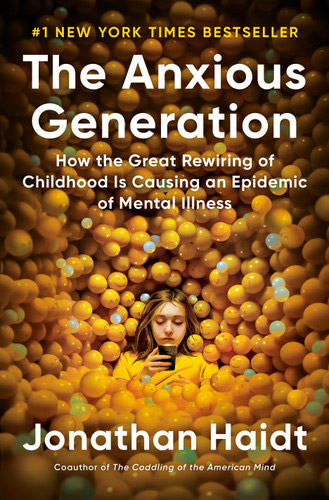
The Anxious Generation: How the Great Rewiring of Childhood Is Causing an Epidemic of Mental Illness
By: Jonathan Haidt Category: Nonfiction Published: 2024 Share: More DetailsRecommended by David H. Rosmarin, Associate Professor of Psychology, Harvard Medical School, psychologist at McLean Hospital, director of the Spirituality and Mental Health Program
“The Anxious Generation” by Jonathan Haidt examines social and cultural factors contributing to a surge in anxiety, depression, and suicidality among American youth. With scholarly rigor and an accessible style, Haidt traces the current mental health crisis to the mid-2010s, when smartphones and social media began to reshape the social landscape for adolescents. He poignantly argues that shifting from in-person to electronic social interactions led to “safetyism,” which prioritizes excessive protection from harm. Haidt illustrates that overreliance on technology has all but eliminated unstructured play from the lives of children and adolescents, thereby reducing opportunities to engage with manageable risks, typical setbacks, failures, and healthy social challenges. Haidt adds that smartphone technologies have led to overparenting — e.g., over-communication, constant notifications, and GPS tracking of children’s whereabouts. He asserts that these trends have robbed an entire generation of the resilience, coping skills, and independence needed to navigate everyday stressors, and in turn created unprecedented levels of anxiety at a societal level.
Reading “The Anxious Generation” brought me back to my own anxieties as a college student in Canada. At that time, I was keen to rid myself of worries about my future and the unpleasant physiological activation this engendered (e.g., tachycardia, stomach upset, muscle tension). In retrospect, with Haidt’s perspective in mind, facing anxiety and uncertainty in my early adulthood engendered motivation and resilience, which ultimately fueled my professional success. As a parent, the book challenged me to think about how alleviating developmentally normative struggles in children may create mental health vulnerabilities down the line. It also convinced me that social media and digital spaces need more regulation to protect the well-being of young users. Of course, there is a delicate balance between coddling and supporting, but Haidt’s main thesis that a technology-based childhood interrupts the process of developing self-efficacy is a much-needed wakeup call.



